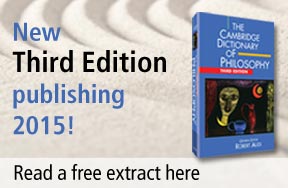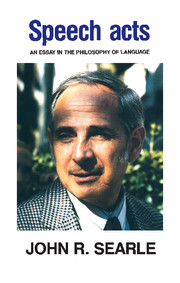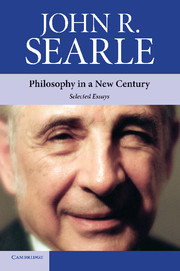John Searle's Philosophy of Language
Force, Meaning and Mind
£75.00
- Editor: Savas L. Tsohatzidis, Aristotle University, Thessaloniki
- Date Published: October 2007
- availability: Available
- format: Hardback
- isbn: 9780521866279
£
75.00
Hardback
Other available formats:
Paperback, eBook
Looking for an inspection copy?
This title is not currently available on inspection
-
This is a volume of original essays on key aspects of John Searle's philosophy of language. It examines Searle's work in relation to current issues of central significance, including internalism versus externalism about mental and linguistic content, truth-conditional versus non-truth-conditional conceptions of content, the relative priorities of thought and language in the explanation of intentionality, the status of the distinction between force and sense in the theory of meaning, the issue of meaning scepticism in relation to rule-following, and the proper characterization of 'what is said' in relation to the semantics/pragmatics distinction. Written by a distinguished team of contemporary philosophers, and prefaced by an illuminating essay by Searle, the volume aims to contribute to a deeper understanding of Searle's work in philosophy of language, and to suggest innovative approaches to fundamental questions in that area.
Read more- An in-depth examination of key aspects of Searle's philosophy of language
- Includes Searle's own current reflections on the subject
- Will appeal to graduate students and scholars in linguistics and cognitive science, especially those with interests in semantics and pragmatics
Customer reviews
Not yet reviewed
Be the first to review
Review was not posted due to profanity
×Product details
- Date Published: October 2007
- format: Hardback
- isbn: 9780521866279
- length: 308 pages
- dimensions: 229 x 152 x 21 mm
- weight: 0.62kg
- contains: 5 tables
- availability: Available
Table of Contents
Introduction Savas L. Tsohatzidis
1. What is language: some preliminary remarks John R. Searle
Part I. From Mind to Meaning:
2. Content, mode, and self-reference François Recanati
3. Searle against the world: how can experiences find their objects? Kent Bach
4. Seeing what is there Robin Jeshion
5. Intentionalism, descriptivism, and proper names Wayne A. Davis
6. On the alleged priority of thought over language Christopher Gauker
7. Rule scepticism: Searle's criticism of Kripke's Wittgenstein Martin Kusch
Part II. From Meaning to Force:
8. How to say things with words Kepa Korta and John Perry
9. Semantics without the distinction between sense and force Stephen J. Barker
10. Dynamic discourse semantics for embedded speech acts Nicholas Asher
11. Yes-no questions and the myth of content invariance Savas L. Tsohatzidis
12. How do speech acts express psychological states? Mitchell Green.
Sorry, this resource is locked
Please register or sign in to request access. If you are having problems accessing these resources please email [email protected]
Register Sign in» Proceed
You are now leaving the Cambridge University Press website. Your eBook purchase and download will be completed by our partner www.ebooks.com. Please see the permission section of the www.ebooks.com catalogue page for details of the print & copy limits on our eBooks.
Continue ×Are you sure you want to delete your account?
This cannot be undone.
Thank you for your feedback which will help us improve our service.
If you requested a response, we will make sure to get back to you shortly.
×







